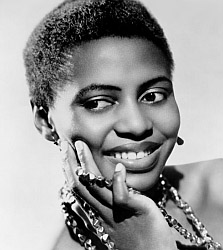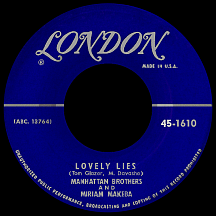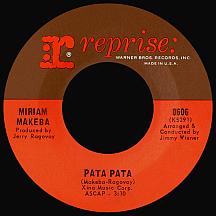MIRIAM MAKEBA
Pata Pata
News about South Africa's apartheid regime sometimes reached my ears when I was a child...and it didn't take long before I realized the country's system had been built upon the poor treatment of all people who weren't white. I didn't understand much about it until later, though it seemed appalling, worse even than the racial issues we had here in the U.S. Singer Miriam Makeba was the first victim of apartheid that I became aware of. She came onto my radar, of course, through my favorite pastime, listening to music on the radio. "Pata Pata," her 1967 hit, offered no clue to her situation, but magazine articles that appeared around the same time certainly did (I eventually found out she'd been getting a lot of press on this issue for several years). Having become a celebrity in South Africa in the '50s made her a target of the government, but not if she stuck to her trade and quietly accepted things the way they were. Which she didn't.
Growing up in Sophiatown, a small community near Johannesburg, was difficult enough. In 1932, shortly after she was born Zenzile Miriam Makeba, her mother was imprisoned for brewing and selling umqombothi, a popular type of African beer, to bring in some desperately-needed extra money. The sentence was six months; Miriam couldn't be separated from her mother at that age, so she went to jail with her. After release, the family moved to Nelspruit, where her father worked for Shell Oil and was able to provide much better living conditions. He died when Miriam was just five years old and she and her mom went to live with her grandmother in Pretoria, just north of Johannesburg. There she attended school and church, listened to the popular singers of the late '30s and '40s (both African jazz and American big band music) and began singing.
During a brief teenage marriage to James Kubay, she gave birth to her only child, Sibongile Makeba (who was nicknamed "Bongi"). She spent the next few years raising her child while working a series of menial jobs. One of her cousins, whose name was Zweli, sang with a vocal group, The Cuban Brothers. She joined, dropped her first name, and before long Nathan Mdledle of popular group The Manhattan Brothers spotted her and made an offer to expand his quartet with Miriam as a female co-lead. The other members of this well-dressed, already-well-known act that often enhanced Zulu melodies with American influences were Joe Mogotsi, Ronnie Sehume and Rufus Khoza. Their 1954 Gallotone Records recording of "Lakutshona Ilanga," a sad romantic song composed by Mackay Davashe, a saxophonist in the group's backing band, featured Miriam performing in her native Xhosa dialect. The recording was so popular in South Africa that English lyrics ('the devil is a woman!'), completely different from the meaning of the original, were provided by American folk songwriter Tom Glazer, this version released under the title "Lovely Lies." It became an international success as well as a top 50 U.S. hit on London Records in February 1956, one of the earliest songs recorded in Africa to chart in North America (the Bulawayo Sweet Rhythms Band, also from South Africa, had charted with an instrumental, "Skokiaan," in 1954).
In 1956, Miriam met 16-year-old Abigail Kubeka and was so impressed with her talent she convinced her to join a girl group she was putting together. With Mary Rabotapi and Mummy Girl Nketle they became The Skylarks and were very popular the next couple of years performing a mixture of jazz and African styles. In '57, Miriam made an appearance in the dramatic film Come Back Africa ("Lakutshona Ilanga" was one of two songs she performed onscreen) and later traveled to Italy when the film was shown at the Venice Film Festival. Afterwards, she starred with Manhattan Brother Mdledle in a Johannesburg stage presentation of King Kong, a musical based on the life of troubled boxer Ezekiel Dlamini, which later had a lengthy run on London, England's West End.
After being granted a visa to appear in America in 1959, she and the Skylarks recorded a single on the New Sound label, "Miriam's Goodbye to Africa." Little did anyone realize how prophetic the title would be. She married South African singer Sonny Pillay, who accompanied her to London while she waited to have her visa issued, though they were divorced just a few months later. While in London she met Harry Belafonte, who went on to play a large part in her ascent to western stardom. Her first stateside television apparance was on The Steve Allen Plymouth Show on November 1, 1959; she performed two songs that night including a solo rendition of "Lovely Lies." In 1960, she was informed that her mother had died. An effort to return for the funeral was blocked; the South African government had revoked her passport, effectively exiling her, likely for comments she'd made against apartheid. They soon, however, allowed Bongi, age nine at the time, to come to live with Miriam in New York.

With Belafonte's help, she was signed to RCA Victor Records and made her first album, Miriam Makeba (with The Belafonte Folk Singers and guitarist Perry Lopez), which included several Xhosa songs and others of African origin she'd sung for years. One track was "The Click Song," listing Miriam and all of the Manhattan Brothers as songwriters, which became one of the most in-demand songs at her shows. At the Grammy Awards in April 1961 she was celebrated as the first South African nominated (in NARAS's brief three-year history); two nominations came for the album in the categories Best Folk Performance and Best Vocal Performance Album, Female, while a third nod was for Best New Artist (comedian Bob Newhart took home the trophy).
At President John F. Kennedy's 1962 Birthday party celebration held at New York's Madison Square Garden May 19, 1962, Makeba was one of 20 celebrities invited (though she didn't perform). An album for Kapp Records, The Many Voices of Miriam Makeba, offered versions of songs from South Africa, Brazil and other global regions; trumpeter Hugh Masekela, who'd been part of the band in the King Kong musical (and, like Miriam, had been exiled by apartheid), took part in the sessions. While she thrived in the U.S., her records were banned in South Africa. Grammy nominations kept coming for RCA Victor recordings; there were two in 1963 for The World of Miriam Makeba in the same categories as the first LP and another for 1964's The Voice of Africa in the Best Folk Recording category. By that time she had married Masekela, yet wedded bliss continued to be elusive. They were divorced after two years.
Two final Grammy nominations (bringing the total to eight) came in March 1966 for albums released the previous year...and both were in the same category! Her solo LP Makeba Sings! competed for the Best Folk Recording award against An Evening with Belafonte/Makeba, a studio collection of Xhosa and Zulu songs recorded separately by each singer in addition to two duets, "Train Song" (also issued as a single) and "My Angel." The latter LP secured the win and Miriam added "Grammy winner" to her resumé. Meanwhile, she performed throughout the world, never hesitating to make comments about the horribly racist conditions in her home country, in effect guaranteeing she would never be able to return...unless some miracle were to occur. But what were the chances?
Following two albums for Mercury Records, she signed with Reprise and was photographed more frequently wearing African garb (colorful sarongs and headdresses). Her album Miriam Makeba in Concert! was a strong seller despite the inclusion of many previously-released songs. The label teamed her with experienced American producer Jerry Ragovoy and arranger Jimmy Wisner and in the fall of 1967 she had her biggest hit: "Pata Pata," an infectious dance track (complete with "click" sounds!), its title translated as "touch touch." Mostly sung in Xhosa, it contained spoken English parts: 'Pata Pata is the name of the dance...we do down Johannesburg way...and everybody starts to move...as soon as Pata Pata starts to play!' Again she set a record: the first black African woman with an American top 20 hit. And it spoke to everyone's fun side: 'Every Friday and Saturday night...it's Pata Pata time! The dance keeps going all night long...'til the morning sun begins to shine...heeyy!'
"Malayisha," a Xhosa song about a lumberjack with female admirers, spent a few weeks on the charts in early 1968. Its follow-up, "What is Love," is a tender ballad penned by Ragovoy that's reminscent of the kind of song Belafonte excelled at. Makeba's late '60s phase contemporized her a bit, helping to make her relatable to slightly younger, less-politically-minded listeners. That being said, her political leanings ramped up during that time; in 1968 she married Stokely Carmichael, the controversial "black power" figure from Trinidad, leaving little doubt as to her position. Many fans abandoned her, concert promoters were no longer interested; it happened very quickly. In '69 the couple moved to Guinea, West Africa where they lived for several years before divorcing in 1978.
In 1985, third-time-pregnant daughter Bongi died while in labor; a depressing turn of events for her mother. In 1987 she resumed performing, joining Paul Simon in Zimbabwe during his much-lauded Graceland tour (Masekela was there too). In 1990, as apartheid weakened, Nelson Mandela, one of the movement's greatest opponents, was released after 27 years in prison (and later became South Africa's first elected president). He arranged for Miriam Makeba's return to South Africa after more than three decades. She lived in her homeland for the rest of her life; her autobiography, Makeba: My Story, was published in 2004. The icon who'll always be remembered as "Mama Africa" unexpectedly passed away in November 2008 during a brief journey away from South Africa, following a concert in Caserta, Italy.



